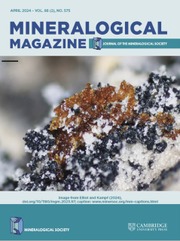Article contents
Hydroxyplumbopyrochlore, (Pb1.5,□0.5)Nb2O6(OH), a new member of the pyrochlore group from Jabal Sayid, Saudi Arabia
Published online by Cambridge University Press: 10 September 2020
Abstract
A new mineral species of the pyrochlore supergroup, hydroxyplumbopyrochlore (IMA2018-145), (Pb1.5,□0.5)Nb2O6(OH), has been discovered in the Jabal Sayid peralkaline granitic complex of the Arabian Shield, Saudi Arabia. It is associated with quartz, microcline, ‘biotite’, rutile, zircon, calcite, rhodochrosite, columbite-(Fe), goethite, thorite, bastnäsite-(Ce), xenotime-(Y), samarskite-(Y), euxenite-(Y), hydropyrochlore and fluornatropyrochlore. Hydroxyplumbopyrochlore usually shows euhedral octahedra, slightly rhombic dodecahedra and cubes or their combination (0.01–0.06 mm). The mineral is pale yellow to pale brown, transparent with white streak, and has adamantine to transparent lustre. It is brittle with conchoidal fracture. No cleavage or parting are observed. It is isotropic and non-fluorescent. The average microhardness is 463.4 kg mm–2. The calculated density is 6.474 g cm–3.
Hydroxyplumbopyrochlore belongs to the cubic crystal system and exhibits the space group Fd $\bar{3}$m with unit-cell parameters a = 10.5456(6) Å, V = 1172.8(2) Å3 and Z = 8. Electron microprobe analysis gave (6-point average composition, wt.%): CaO 0.32, SrO 0.16, FeO 0.17, Ce2O3 0.07, Pr2O3 0.02, PbO 51.69, Nb2O5 40.06, SiO2 0.05, TiO2 1.68, Ta2O5 4.74, H2Ocalc 0.95, total 99.90, yielding the empirical formula (Pb1.34Ca0.03Fe0.01Sr0.01□0.61)Σ2(Nb1.75Ti0.12Ta0.12Si0.01)Σ2O6(OH0.53O0.08□0.39)Σ1, where □ = vacancy. The Raman spectrum of hydroxyplumbopyrochlore contains the characteristic bands of O–H vibrations and no bands for H2O vibrations.
$\bar{3}$m with unit-cell parameters a = 10.5456(6) Å, V = 1172.8(2) Å3 and Z = 8. Electron microprobe analysis gave (6-point average composition, wt.%): CaO 0.32, SrO 0.16, FeO 0.17, Ce2O3 0.07, Pr2O3 0.02, PbO 51.69, Nb2O5 40.06, SiO2 0.05, TiO2 1.68, Ta2O5 4.74, H2Ocalc 0.95, total 99.90, yielding the empirical formula (Pb1.34Ca0.03Fe0.01Sr0.01□0.61)Σ2(Nb1.75Ti0.12Ta0.12Si0.01)Σ2O6(OH0.53O0.08□0.39)Σ1, where □ = vacancy. The Raman spectrum of hydroxyplumbopyrochlore contains the characteristic bands of O–H vibrations and no bands for H2O vibrations.
- Type
- Article
- Information
- Copyright
- Copyright © The Author(s), 2020. Published by Cambridge University Press on behalf of The Mineralogical Society of Great Britain and Ireland
Footnotes
Associate Editor: Daniel Atencio
References
- 6
- Cited by


